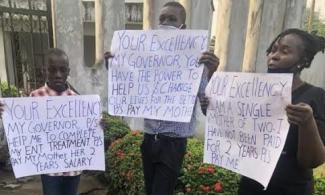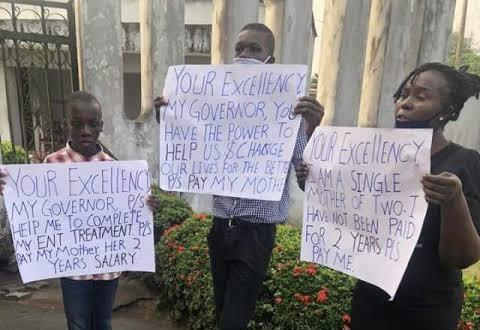
Their leader said the judges live on loans and family and friends' money.
In Cross River State, magistrates, who protested for several days at the governor's office over two years' unpaid salaries, say it's been difficult to feed their families.
According to a Punch report, their leader, Solomon Abuo, said the judges live on loans and family and friends' money.

He said, "Throughout these two years of the non-payment of our salaries, we have been surviving through loans we obtained from banks, friends and family members. Some of our family members and friends have been very helpful by giving us alms despite their family burdens.
"These last two years have been hellish and dehumanising because we have been reduced to beggars to survive. We can't pay our children's school fees, hospital bills, and house rents. Many of us have suffered the humiliation of either being thrown out of our rented apartments by our landlords or the threat of the same for being unable to pay our rents.
"Our children suffer the humiliation and psychological trauma of being driven from school because we cannot pay their fees. Feeding our families has been very difficult."
He said since the withdrawal of the protesting judges from the courts; they stayed at home in compliance with the directive of the former acting Chief Judge, Justice Eyo Effiom-Ita.
Abuo said the magistrates had addressed a letter to the acting chief judge to reverse the indefinite withdrawal or sit-at-home directive as it would affect their annual performance evaluation. He said they haven't received any response to the letter.
He clarified that the judges never agreed to forgo the 24-months salary arrears.
Abuo said, "We never agreed at any time to forgo our two years salaries. When the state government made the request, we quickly held an emergency meeting to unanimously refuse to accede to the request. Our position was communicated to the state government through the Attorney General and Commissioner for Justice, Tanko Ashang, in a letter dated January 19, 2021."
He said the judges endured the non-payment for two years while sending letters to the government alongside dialogue that never worked. The failure of the government to heed, he said, led to the protest.
"It took us two years to protest the non-payment of our salaries because we felt that it was better for us to appeal to the government through writing letters and dialogue. We saw this as the best approach, instead of being confrontational. Our pleas and appeals fell on deaf ears; so, we had no other choice but to resort to a peaceful protest to press home our demands."
Reacting to allegations that some of the judges compromised in the discharge of their duties, Abuo said, "To the best of my knowledge, none of us has faced any disciplinary panel of the Judicial Service Commission for acts of corruption. Our position is that, if there's any complaint against any of us for engaging in corrupt practices, such a complaint should be promptly treated by the JSC, and if found guilty, the culprit(s) should be dealt with accordingly."
He added that the Nigerian Bar Association had assured judges of intervening by engaging with the state government to resolve it.
He revealed plans for another protest peradventure the agreement reached with the state government does not materialise.
"It's undeniable that our state government is not fair to us. Every labourer deserves his wages. That is the barest minimum the government owes us. We are not asking for too much, just our salaries so that we can live a dignified life."